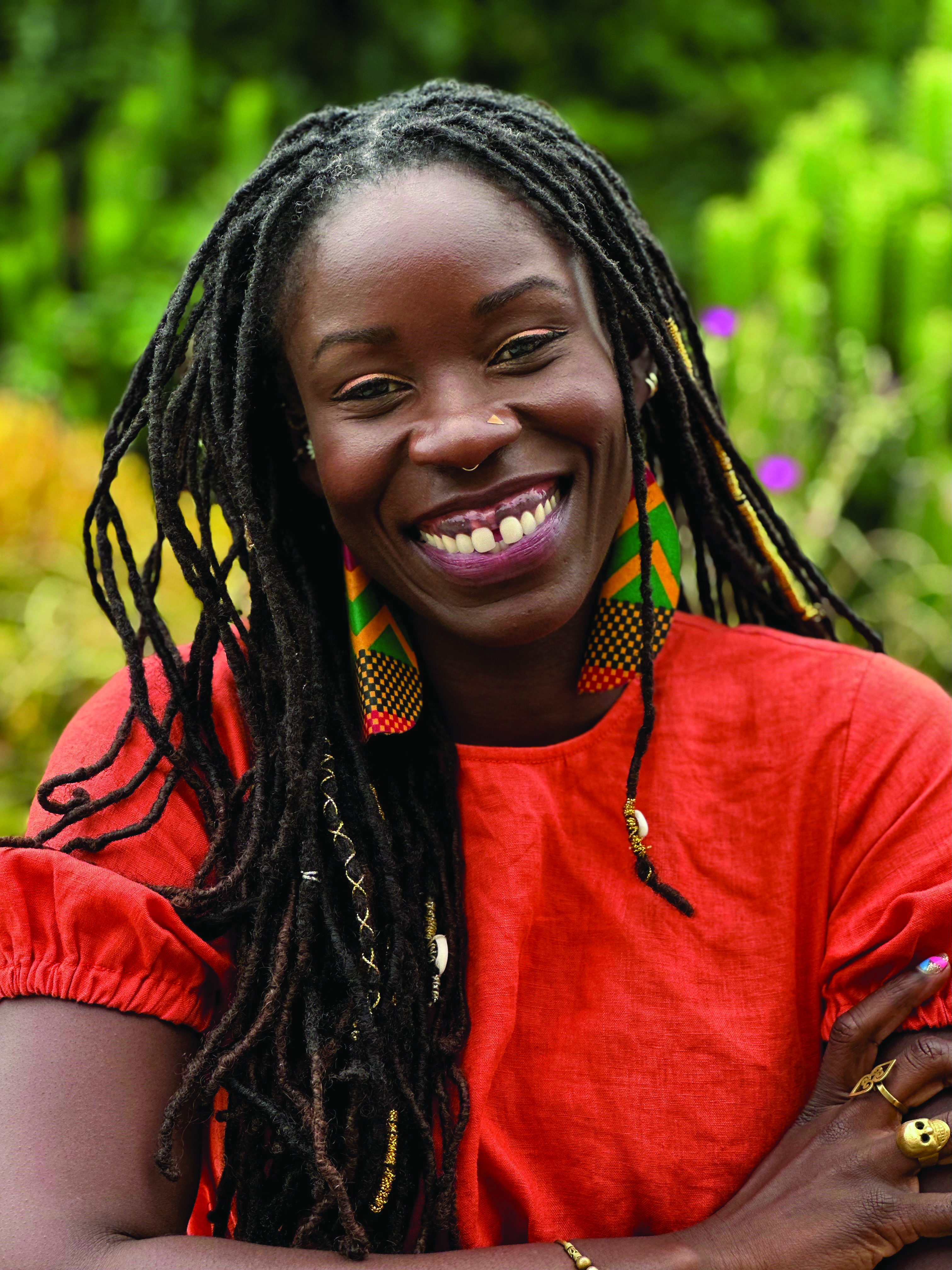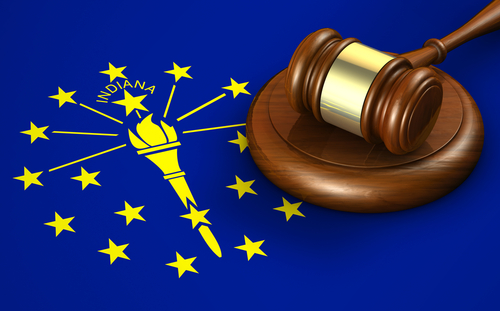This Los Angeles lawyer found her calling as a death doula

Alua Arthur left a career in public interest law to help people and their loved ones embrace death and dying. Photo by Yeofi Andoh.
Everyone is going to die, it’s just a matter of where, when and how. For those who happen to know the specifics of their situation, Alua Arthur, a former legal aid lawyer, can help.
Arthur is a certified death doula, which means she provides emotional and organizational support for people who are nearing death, allowing them to embrace the end in a way that honors their wishes, customs and beliefs. She also trains death doulas and provides death-related resources, workshops and webinars through Going with Grace, the end-of-life planning organization she founded in 2012. A memoir she wrote, Briefly Perfectly Human, drops in April. In it, she shares her personal journey through depression, death and self-discovery that led her from the law to her current career.
I know your book is a memoir, but does it also provide information and wisdom to those facing death?
I hope so. For most of us, the process of preparing to die requires us to create some context of our lives—to look at who we actually became as opposed to who we were told that we should be. And that’s where this book comes in.
Sounds like something that could be very helpful for lawyers.
Absolutely. I think a lot of lawyers are driven by external pressures like success and achievement—at least I was.
Is that what led you to become a lawyer, that need to succeed?
I am Ghanaian, and growing up, it was expected that I was going to be a lawyer, doctor or engineer. Thankfully, I did well in school. But when I got to the end of my college education, I didn’t know what else to do. I had been really involved in policy stuff—I had taken a big stand against student loans when I was in college—and my dad said, “Listen, if you want to effect change, you should become a lawyer because you can do policy work, you can go to the courtroom, you can work directly with clients—you can do anything if you become a lawyer.” And so I went to law school.
I want to ask about your career path from law to end-of-life care, but let’s start at the beginning, with your law practice.
I started my legal career with the Legal Aid Foundation of Los Angeles in the government benefits program. It was really hard because it’s tricky to have an intellectual understanding of how much wealth this country has and then to see how it treats the people who are most in need. The way the system was designed, it seemed to keep poor people poor, and it felt like there was no way for them to actually break out of it, and it broke my heart.
After a couple of years there, I transferred to the family law unit, where I worked with a lot of immigrants who were victims of domestic violence, helping them get safe and hopefully break the cycles of violence, because more often than not, somebody who’s in a domestic violence situation was raised up in one. Similarly, though, the same clients kept coming back, and I felt like I wasn’t getting anywhere.
Then I left to go into community economic development, where I worked with groups of dreamers to create nonprofit organizations in local neighborhoods in LA. I worked with mostly charter schools, and it was a bit more rewarding in that there were tangible results of what I was doing.
Was that where you were when you began to experience depression?
Yes. But I had already started to feel like there were parts of me that weren’t being used well in my chosen profession. I always had the desire to walk alongside my clients in their journeys, and I was tasked with only a small part of what they needed. I had a client who was a former sex worker, and my job was to help her figure out how to navigate social services. I would have loved to sit with her and talk about trauma and pain and healing and habits, but there wasn’t capacity, there wasn’t time. I also didn’t have the skill set—I was never trained to do so. So the depression started creeping in.
I didn’t know what to do. So I just kept going. Then budget cuts changed the nature of my job, and I was no longer able to work with clients directly. Client involvement was what had kept me engaged in the work for so long, and when that went away, I wilted like a flower in the dark. Everything just kind of fell apart. I took a leave of absence from work, and until recently, [I was] the only lawyer I knew who had taken a medical leave of absence for mental health.
When it comes to lawyers and mental health, denial is real—as is avoidance and compartmentalization.
And also stigma. When I left, there was a lot of office gossip. My friends would call and be like, “Are you pregnant?”
I know you did a lot of traveling during this time, including a trip to Cuba, where you befriended a fellow traveler, a German woman who had been diagnosed with life-threatening cancer. Was that your first experience with death?
Yes. It’s so bizarre to think that I was 34 years old at the time, and it had never properly crossed my mind that one day I would die. I don’t understand how that’s possible. I had taken philosophy classes in college. We tossed around all these big ideas. I was no stranger to psychedelics. And still, I had kept death at arm’s length. Then all of a sudden, it was in my face, and I’m so grateful it was. Then after I came home, my brother-in-law got sick. I formally resigned from my job and moved in with my sister.
In the weeks leading up to his death, I remember I was desperate for somebody to help us. I remember sitting there watching my sister stare mindlessly into the sky and trying to figure out how on earth she was going to manage all the things that she needed to do to wrap up my brother-in-law’s life. I was like, there’s no way she’s gonna be able to manage this right now—she’s too deep in grief. I was deep in grief and struggling too, and I wished someone could do it for her or at least walk her through it. That’s when I thought, well, duh—I can do that.
Did you already know about death doulas?
No. But I started talking to everybody I knew about it. Most people looked at me like I had grown an extra head, but I did get a decent amount of encouragement from people who agreed that this seemed to be missing. My therapist at the time told me about somebody she knew who had gone to death doula training. I took the course, and I left dancing and singing and crying and confused and happy and terrified. But it felt good. The program was mostly focused on preparing bodies and providing support for home funerals, which was all super useful, but there were things that I needed when my brother-inlaw was dying that weren’t present in the course.
So I sought out everyone who could teach me more. I called my estate planning buddies. I got a job at a hospice and volunteered at another hospice. I got a license to sell life insurance because I needed to understand that system. I went on ride-alongs with EMTs and hospice nurses. I got a job at an alternative funeral home. Basically, I would sit and talk to anybody who would have me. I was just trying to learn, learn, learn, learn, learn until I was finally able to cobble together a practice that supported people the way that I wished my sister and I had been supported.
Talk to me about the decision to build out your business.
I knew immediately this was what I wanted to create, which is why I started learning all these practice areas. As I started doing it, I kept noticing areas where we could continue to be supportive. The teaching came about because it just makes sense. I can only serve one family at a time, but if I teach five people, we can serve five more people. We have folks of all different ages and colors and body ability and neural divergence and gender identity. And that’s what I think the death and dying community really needs, what the world needs.
Is it ever depressing to be so close to death all the time?
Not at all. There is so much life when dying is occurring. That’s part of the reason I stick with it—I feel so alive when I get to support people in this capacity and to be with them as they’re dying. It’s incredible. I’m a bit of a dreamer. My head is in the clouds, which didn’t serve me very well in the practice of law, but I think everybody understands that there is advocacy in death and dying—somebody hears you and does their best to make sure your desires are carried out.
I would like to see death doulas integrated into every strata of society. We should be in hospitals. We should be in schools to help kids when their grandparents die or when their dogs die. We need to be in police departments, fire departments, prisons. Also, folks need to be doing end-of-life planning earlier, and I would love for that to be part of corporate benefits packages. Estate planning attorneys should have death doulas to help folks complete their end-of-life planning documents. I very clearly see a world where we don’t push death, dying and grief into the corner, but rather we support our fellow humans in this really, really difficult human experience and journey with them while they navigate it.
This story was originally published in the April-May 2024 issue of the ABA Journal under the headline: “Life Support: This Los Angeles lawyer found her calling as a death doula”



